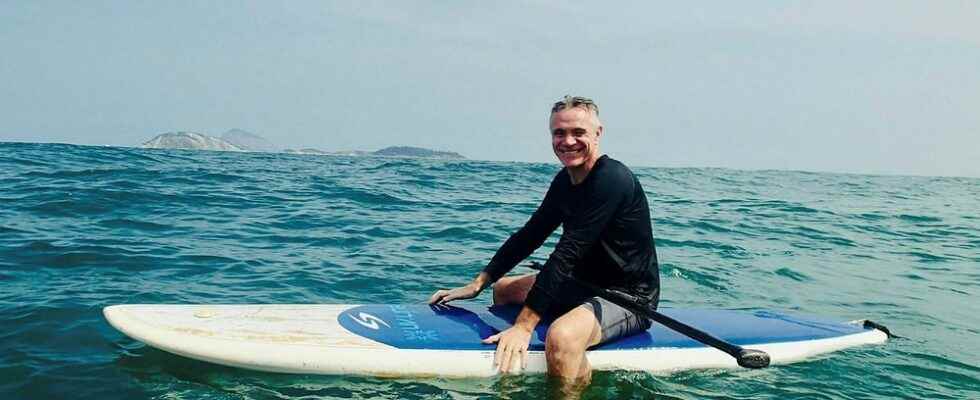The first time I met Dom Phillips was at a dinner with foreign journalists in São Paulo 14 years ago. He was different. Dom, or Dominic as he is actually called, had not come to Brazil to write about political developments. He had fallen in love with Brazilian music. The year before, he had published a groundbreaking book in the UK about the DJs of fox culture, “Superstar DJs – Here We Go!”.
Every time I was in São Paulo we met and the conversations always revolved around music. For me, it was liberating. They saw the beauty of Brazil and highlighted the unique Brazilian cultural heritage. He did not write about corruption, politics and organized crime, but about the rhythms, colors and artists that few outside Brazil know.
A few years later, to my delight, he moved to Rio de Janeiro. We met more and more often. I loved his humor. It was so British. He had grown up in Liverpool, but on the other side of the river – Merseyside – and therefore kept Everton FC. Not a sentence came out of his mouth but a tone of irony. He loved to bully me because Abba was Swedish. His favorite song was “The Winners Takes It All”. The fact that he had a Danish girlfriend and lived in Denmark for five years made him understand Scandinavian culture. He knew what what Danes call “coziness” meant (cozy).
After a few years as a freelance music writer in Brazil, he gave up. The interest in Brazilian music abroad is not as great as he had hoped. Instead, he began monitoring political developments in Brazil on behalf of The Guardians. The 2014 World Cup and the 2016 Olympics were just around the corner and the southern hemisphere’s largest country was suddenly in focus. In the end, he became like me – a foreign correspondent in Rio de Janeiro.
It was also in Rio that he met his wife.
Once at a party, where I fainted because of too much sun, beer and too little water, his face was the first thing I saw when I recovered. They were worried that I had had a concussion because I had hit my head on a pile of cobblestones when I fainted. He wanted to take me to the hospital. I waved it off. Instead, he fetched water, poured it over my head, and slapped my cheeks to make sure I was okay. After drinking a few bottles of water, I was on my feet again.
We got closer to each other after that party. We used to see each other in Flamingo Park or cycle to the marina in Urca. One day he was extra happy. He had received a generous scholarship from an American foundation to write a book on what needs to be done to save the Amazon. The scholarship was enough so that he would not have to write articles for the bread for a year. In connection with this, he and his wife moved to her hometown of Salvador in northeastern Brazil. It is geographically closer to the Amazon and gave him peace of mind to write the book. There was also another thought. He and his wife had been trying to adopt a child in Rio for several years. The sex did not move. In Salvador, the queue was much shorter. He and his wife had hopes of adopting this year.
Now it will not be so. My beloved friend was murdered when he was on one of his last trips to the Amazon before the book was to be written. After that, he only had a couple of smaller trips left. The interest in the book was enormous. Several countries had bought the rights to publish it. In Sweden, his book, which had the working title “How To Save the Amazon”, was to be published by Albert Bonniers Förlag. One week before they disappeared on June 5, we chatted. I wondered how the book went.
It’s coming on fine. Long way to go, but I have taken a big bite “, he replied.
That was his last word to me. We will never read his book on the Amazon. That book was also killed when he was shot in his boat on the Itaquai River and buried three kilometers into the rainforest. A suspected perpetrator has admitted that he shot Dom because he and his travel companion, the indigenous expert Bruno Pereira, saw him poaching in one of the indigenous people’s reserves. One of my best friends in Brazil is gone. He’s not coming back. It hurts to realize.
The only consolation is that the assassination of Dom Phillips and Bruno Pereira sheds light on the lawless part of the Amazon that Brazilian President Jair Bolsonaro wants the world not to see. In the Javari Valley, Peruvian and Colombian cocaine smugglers meet with a Brazilian mafia that controls the region. The criminal activity can only work if the state is not present, which Bolsonaro ensured during his time in power. He has weakened the presence and protection of those who defend the rainforest.
“We will only have peace when the necessary measures are taken so that tragedies like this never happen again,” wrote Alessandra Sampaio, Dom Phillip’s widow in a statement.
May my friend’s death not be in vain. The Phillips stood up for the Amazon. Now we others must take over.
Read more:
Police: Found the British journalist’s remains in the Amazon
One in two suspects admits fatal shooting of missing persons in Amazonas
Hope to find the missing men in the Amazon – another man arrested
Human remains found in the Amazon
Reporters and indigenous experts are missing in the Amazon
